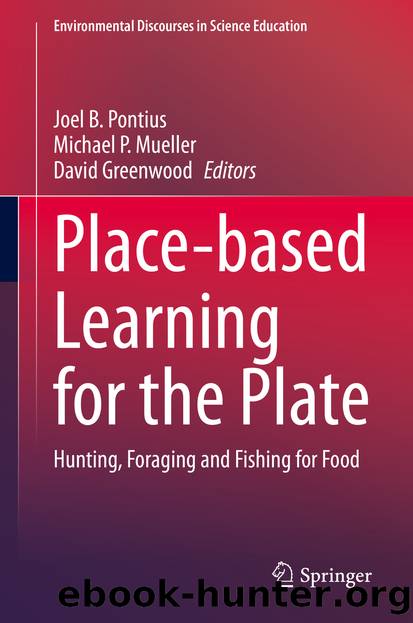Place-based Learning for the Plate by Unknown

Author:Unknown
Language: eng
Format: epub
ISBN: 9783030428143
Publisher: Springer International Publishing
Alison:
On one hand, I have sympathy for educators trying to deal with complex environmental issues, as they must trust reviews of scientific literature and are not always able to engage with the continuing debates and contested ideas – the hallmark of science – for understanding all elements of all issues. On the other hand, following natural and physical scientists blindly without considering social research is a continuing frustration for me. Literature which should be trustworthy can have important gaps. A report by the European Academies’ Science Advisory Council and the Joint Research Centre of the European Commission (2016), on marine sustainability betrays a woefully limited understanding of marine issues: that which ignores all social sciences (Symes and Hoefnagel 2010) and fishers’ knowledges (Hind 2015), similar to my experiences in policy meetings in the Azores (Neilson et al. 2016). The working group of 20 “European science academics” and the eight peer reviewers are composed entirely of natural and physical scientists without a single social scientist (anthropology, sociology, psychology, education), nor economist. The report claims to provide evidence-based scientific support for EU policies and cites 70 references from which the evidence is drawn, and the recommendations based. Of these papers, 70% are about natural and physical sciences, and the rest are documents about existing policy. Nevertheless, the lack of specialists or social science research did not prevent the working group from making statements and recommendations about demography, economy and education. They call for further support for research without showing that the problems of marine sustainability are caused by lack of knowledge or innovation. Meanwhile the sound of Blue Growth rings through the halls of Brussels (EU Commission headquarters), and ministers of fisheries and marine affairs attentively listen to heads of banks and other financial institutions committed to shareholder profit give keynote addresses at international Ocean congresses extolling the virtues of privatization and enclosing the ocean, without hearing from the economists and social scientists who offer strong critiques to this approach of private property as essential for conservation and the Tragedy of the Commons, a long disputed myth evoked still by bankers and many fisheries biologists.
Download
This site does not store any files on its server. We only index and link to content provided by other sites. Please contact the content providers to delete copyright contents if any and email us, we'll remove relevant links or contents immediately.
POP by Steven Heller(3361)
Japanese Design by Patricia J. Graham(3174)
The Power of Broke by Daymond John(2986)
Architecture 101 by Nicole Bridge(2802)
Indistractable: How to Control Your Attention and Choose Your Life by Nir Eyal(2387)
Fusion 360 for Makers by Lydia Sloan Cline(2358)
Batik by Rudolf Smend(2184)
Actionable Gamification: Beyond Points, Badges, and Leaderboards by Yu-kai Chou(2157)
Origami Art by Michael G. Lafosse & Richard L. Alexander(2097)
Homebody by Joanna Gaines(2064)
Whiskey in a Teacup by Reese Witherspoon(1980)
Worn in New York by Emily Spivack(1962)
Feng Shui by Stephen Skinner(1940)
Austin Kleon by Steal Like an Artist(1937)
Simple Gatherings by Melissa Michaels(1898)
Don't Make Me Think, Revisited: A Common Sense Approach to Web Usability by Steve Krug(1864)
Ryan Korban by Ryan Korban(1765)
The Joy of Hygge by Jonny Jackson(1742)
Hygge: The Danish Art of Happiness by Marie Tourell Søderberg(1728)
